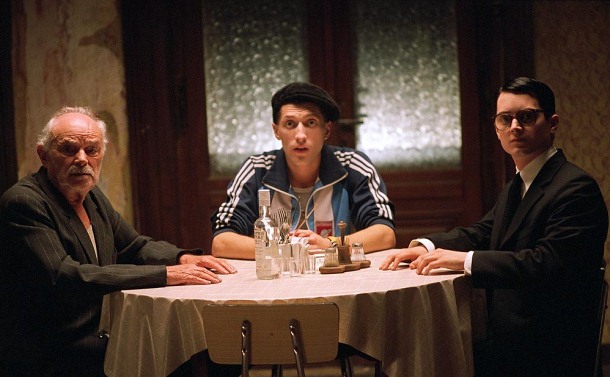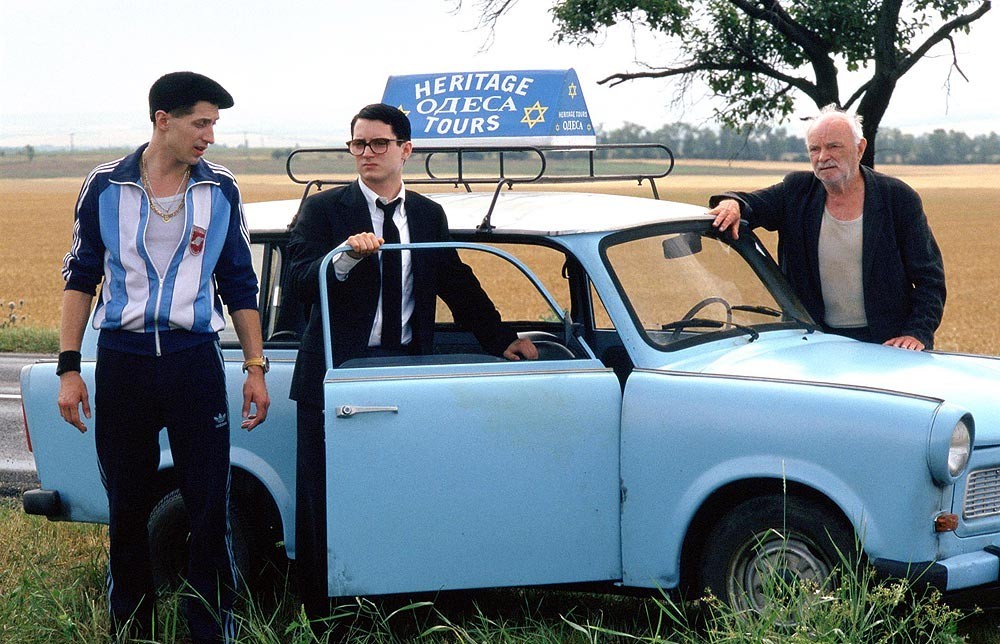Everything Is Illuminated (2005)
CAST: Elijah Wood, Eugene Hutz, Boris Leskin
REVIEW:
One could see how actor Liev Schreiber’s directorial debut might strike a cord with him personally (like the film’s protagonist, Schreiber is Jewish), but while Everything Is Illuminated might mean something to Schreiber, that doesn’t mean it translates that meaning to a mainstream audience. An adaptation of the same-named book by Jonathan Safran Foer, a semi-fictionalized account of his real-life quest into his family’s Holocaust-era background, Everything Is Illuminated has earnest intentions and some humorous and poignant moments, but the overall experience is too muted and too obtuse to reach the illuminating profundities it aims for. There are bright spots in 110-minute journey, but too much tedium to contend with for insufficient rewards.
Everything Is Illuminated is mainly a quirky road trip undertaken by a fictionalized version (with the weirdness level ratcheted up) of the author Jonathan Safran Foer (Elijah Wood), a young American Jew who travels to the Ukraine to track down the woman who saved his family from the Nazis during WWII. Upon arrival, he is met by his less-than-reassuring “translator” Alexander (Eugene Hutz), who calls him “Jonfen”, speaks garbled English, and is accompanied by his surly anti-Semitic grandfather (Boris Leskin), who believes he is blind and drives with the help of his “seeing-eye bitch”, a dog dubbed Sammy Davis Jr. Jr. Jonathan—who’s terrified of dogs and not reassured by his translator’s questionable grasp of English or his “blind” driver—is unimpressed, but the mismatched trio sets off on a road trip across the Ukrainian countryside that will lead to revelations for more than one of them.
 For a while, Everything Is Illuminated moves along at a decent pace and has a degree of effective, albeit quirky comedy. There’s all kinds of strangeness going on; Jonathan is a solemn, inscrutable young man who wears oversized glasses that make Elijah Wood’s eyes look even bigger than usual, dresses like he’s on his way to a funeral, and has an OCD habit of collecting random items—everything from old antiques to used condoms, toiletries from his train bathroom, and his late grandmother’s false teeth—and placing them in meticulously labeled and catalogued ziploc bags which he pins to his bedroom wall. Alexander has a haphazard grasp of English but is a big Michael Jackson fan and a “premium” dancer. For the first act or so, the movie wrings decently-paced humor out of how odd and mismatched everyone in the car is, and how “Jonfen” and Alexander struggle to communicate (and the awkwardness that ensues when Jonathan reveals he understands enough bits and pieces of his drivers’ language to know when Grandfather is making anti-Semitic commentary about him). Unfortunately, it doesn’t take long for the meandering journey to get muddled and tedious, or for the quirkiness which is initially moderately amusing to get old, and the end payoffs aren’t worth the time spent getting there. Part of the problem is that we don’t care about the characters. Jonathan is a blank slate who doesn’t give the viewer anything to connect with, an inscrutable emotionally-repressed empty suit who has some sort of obsessive-compulsive disorder (combined with autism?), but the movie isn’t interested in delving into it beyond his surface strangeness. For Jonathan, there’s little to no substantive arc. Apart from a couple low-key glimmers of emotion and a little softening toward his traveling companions, he’s largely the same at the end as the beginning. In fact, the most intriguing character is Alexander’s grandfather, about whom a surprising and poignant revelation is eventually made. Maybe the movie should have put more emphasis on the Holocaust-related flashbacks and how they relate to Grandfather instead of a tedious road trip with weird people.
For a while, Everything Is Illuminated moves along at a decent pace and has a degree of effective, albeit quirky comedy. There’s all kinds of strangeness going on; Jonathan is a solemn, inscrutable young man who wears oversized glasses that make Elijah Wood’s eyes look even bigger than usual, dresses like he’s on his way to a funeral, and has an OCD habit of collecting random items—everything from old antiques to used condoms, toiletries from his train bathroom, and his late grandmother’s false teeth—and placing them in meticulously labeled and catalogued ziploc bags which he pins to his bedroom wall. Alexander has a haphazard grasp of English but is a big Michael Jackson fan and a “premium” dancer. For the first act or so, the movie wrings decently-paced humor out of how odd and mismatched everyone in the car is, and how “Jonfen” and Alexander struggle to communicate (and the awkwardness that ensues when Jonathan reveals he understands enough bits and pieces of his drivers’ language to know when Grandfather is making anti-Semitic commentary about him). Unfortunately, it doesn’t take long for the meandering journey to get muddled and tedious, or for the quirkiness which is initially moderately amusing to get old, and the end payoffs aren’t worth the time spent getting there. Part of the problem is that we don’t care about the characters. Jonathan is a blank slate who doesn’t give the viewer anything to connect with, an inscrutable emotionally-repressed empty suit who has some sort of obsessive-compulsive disorder (combined with autism?), but the movie isn’t interested in delving into it beyond his surface strangeness. For Jonathan, there’s little to no substantive arc. Apart from a couple low-key glimmers of emotion and a little softening toward his traveling companions, he’s largely the same at the end as the beginning. In fact, the most intriguing character is Alexander’s grandfather, about whom a surprising and poignant revelation is eventually made. Maybe the movie should have put more emphasis on the Holocaust-related flashbacks and how they relate to Grandfather instead of a tedious road trip with weird people.
Like his director Schreiber, one is tempted to give Elijah Wood credit for marching to the beat of his own drum and picking these kinds of offbeat little indie projects, even if the results are lackluster. It’s clear Wood has an affinity for offbeat material—despite how bizarre Jonathan is, Wood seems weirdly more at home in this role than he did as a far more normal, straightforward character in this year’s Green Street Hooligans (consider the fact that this same year also had a weird, creepy bit from him in Sin City)—but Jonathan’s closed-off blankness doesn’t give us much to grab onto in the way of an engaging or relatable protagonist. His co-stars fare better. Veteran Russian actor Boris Leskin is reliable, and Ukrainian musician Eugene Hutz who has no previous acting experience acquits himself naturally and credibly (and vaguely recalls a young, Ukrainian John Turturro). Hutz’s band Gogol Bordello (whose members include Elijah Wood’s offscreen girlfriend) makes a cameo.
One could see how some potentially powerful aspects of Everything Is Illuminated are buried in a disjointed film of excessive quirkiness and road trip tedium. Maybe if the novel’s more extensive Holocaust flashbacks had been included, or the characters had been more developed, or if Jonathan had been allowed to act like a human being, we might have gotten more out of it. Maybe Liev Schreiber’s directorial inexperience is at fault, or maybe Foer’s style doesn’t translate well to the screen. In any case, the movie clearly has earnest intentions and some commendable qualities, but for a title that puts such emphasis on “illumination”, Everything Is Illuminated doesn’t clear much up.
* *
